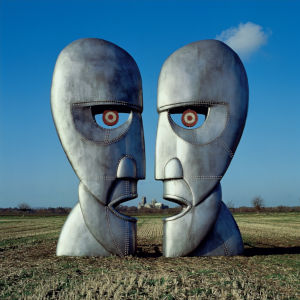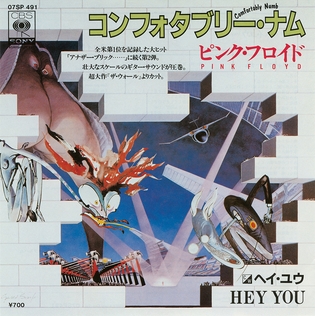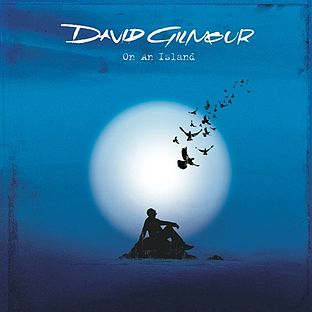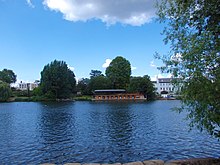
The Wall is the eleventh studio album by the English rock band Pink Floyd, released on 30 November 1979 by Harvest/EMI and Columbia/CBS Records. It is a rock opera about Pink, a jaded rock star who constructs a psychological "wall" of social isolation. The album was a commercial success, topping the US charts for 15 weeks and reaching number three in the UK. It initially received mixed reviews from critics, many of whom found it overblown and pretentious, but later received accolades as one of the greatest albums of all time.

David Jon Gilmour is an English musician, singer and songwriter, who is a member of the rock band Pink Floyd. He joined as guitarist and co-lead vocalist in 1967, shortly before the departure of founding member Syd Barrett. Pink Floyd achieved international success with the concept albums The Dark Side of the Moon (1973), Wish You Were Here (1975), Animals (1977), The Wall (1979) and The Final Cut (1983). By the early 1980s, they had become one of the highest-selling and most acclaimed acts in music history; by 2012, they had sold more than 250 million records worldwide, including 75 million in the United States. Following the departure of Roger Waters in 1985, Pink Floyd continued under Gilmour's leadership and released three more studio albums.

A Momentary Lapse of Reason is the thirteenth studio album by the English progressive rock band Pink Floyd, released in the UK on 7 September 1987 by EMI and the following day in the US on Columbia. It was recorded primarily on guitarist David Gilmour's converted houseboat, Astoria.

Frederick John Westcott, best known by his stage name Fred Karno, was an English theatre impresario of the British music hall. As a comedian of slapstick he is credited with popularising the custard-pie-in-the-face gag. During the 1890s, in order to circumvent stage censorship, Karno developed a form of sketch comedy without dialogue.

The Division Bell is the fourteenth studio album by the English rock band Pink Floyd, released on 28 March 1994 by EMI Records in the United Kingdom and on 4 April by Columbia Records in the United States.

"Comfortably Numb" is a song by the English rock band Pink Floyd, released on their eleventh studio album, The Wall (1979). It was released as a single in 1980, with "Hey You" as the B-side.

"Another Brick in the Wall" is a three-part composition on Pink Floyd's 1979 rock opera The Wall, written by bassist Roger Waters. "Part 2", a protest song against corporal punishment and rigid and abusive schooling, features a children's choir. At the suggestion of producer Bob Ezrin, Pink Floyd added elements of disco.

"Welcome to the Machine" is the second song on Pink Floyd's 1975 album Wish You Were Here. It features heavily processed vocals, layers of synthesizers, acoustic guitars as well as a wide range of tape effects. Both the music and lyrics were written by bassist Roger Waters.
James K. A. Guthrie is an English recording engineer and record producer best known for his work with the progressive rock band Pink Floyd serving as a producer and engineer for the band since 1978. He is the owner and operator of das boot recording in Lake Tahoe, California. Married to Melissa Kathryn (Braun) Guthrie and parent of two cats, Bert & Jack. Original music and scoring.

"Learning to Fly" is a song by the English progressive rock band Pink Floyd, written by David Gilmour, Anthony Moore, Bob Ezrin, and Jon Carin. It was the first single from the band's thirteenth studio album A Momentary Lapse of Reason. It reached number 70 on the U.S. Billboard Hot 100 chart and number 1 on the Billboard Album Rock Tracks chart in September, 1987, remaining three consecutive weeks at the top position in the autumn of the same year. Meanwhile, the song failed to chart on the official U.K. top 40 singles charts. On the other hand, in Spain, the song peaked at number 1 on the Los 40 Principales chart.

On an Island is the third solo studio album by Pink Floyd member David Gilmour. It was released in the UK on 6 March 2006, Gilmour's 60th birthday, and in the United States the following day. It was his first solo album in 22 years since About Face in 1984 and 12 years since Pink Floyd's 1994 album The Division Bell.

"One Slip" is a song from Pink Floyd's 1987 album A Momentary Lapse of Reason.
"Signs of Life" is the opening track on A Momentary Lapse of Reason, the first Pink Floyd album headed by David Gilmour, in the absence of ex-member Roger Waters.
"Terminal Frost" is an instrumental from Pink Floyd's 1987 album, A Momentary Lapse of Reason.

Pink Floyd are an English rock band formed in London in 1965. Gaining an early following as one of the first British psychedelic groups, they were distinguished by their extended compositions, sonic experiments, philosophical lyrics and elaborate live shows. They became a leading band of the progressive rock genre, cited by some as the greatest progressive rock band of all time.
"Sorrow" is a song by the English band Pink Floyd. Written by the band's singer and guitarist David Gilmour, it is the closing track on their thirteenth studio album, A Momentary Lapse of Reason, released in 1987.

"Smile" is a single by guitarist and vocalist David Gilmour, released on 13 June 2006. The song was on the UK charts for 1 week and peaked at 72.

Tagg's Island is an ait (island) on the River Thames on the reach above Molesey Lock and just above Ash Island, located in the London Borough of Richmond upon Thames and part of Hampton. The island is roughly 400 metres long by 90 metres wide at its widest point, covering 6 acres. Although close to the Surrey bank near East Molesey, Surrey, the island is connected to the further Middlesex bank by a single track road bridge, being the only island on the non-tidal Thames accessible by car.
Andy Jackson is a British recording engineer, best known for his work with the British progressive rock band Pink Floyd. He was also the owner and operator of Tube Mastering, a private studio specializing in recorded music mastering.

Rattle That Lock is the fourth solo studio album by English musician David Gilmour. It was released on 18 September 2015 via Columbia Records. The artwork for the album was created by Dave Stansbie from The Creative Corporation under the direction of Aubrey Powell, who has worked with Gilmour and Pink Floyd since the late 1960s.

















